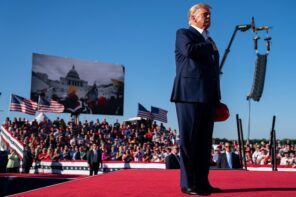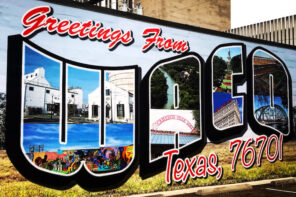Though many religious leaders have sought to turn Mike Brown’s death into a movement for social change, others have taken the position that Brown was a criminal whose actions invited police violence. If the first perspective is attentive to history and systemic racism, the second would treat this incident as just that—one incident, informed only by the details of grand jury testimony.
In my experience—and I would imagine, that of many others—the perspective one adopts on this question usually aligns with her political position, which in turn informs her religiosity. And as with many other issues of partisan import, this one asks people to make a judgment about the nature of governmental power.
Listening to conservative Christian friends defend Darren Wilson this week, I could only marvel at the unblinking trust they placed in a government agent—trust that seems to fly in the face of their otherwise skeptical view of government. Later, on Twitter, one popular user observed, “It seems as if all you have to do to make some conservatives trust the government is shoot an unarmed black teenager.”
Though I am not inclined to attribute such reactions to racism plain-and-simple, they do indicate something about how politics informs our understanding—and approval—of police violence.
My understanding of the events in Ferguson has been very much indebted to Radley Balko, whose excellent book on police militarization has helped me connect the dots on a lot of very important and pressing contemporary topics. (His Washington Post piece on St. Louis County municipalities and the poor is excellent too.) In chapter seven of his book, Balko observes that political impressions of police violence have everything to do with who orders it, who receives it, and why.
If the standard conservative view in this instance holds that police need to be well-armed and vigilant when dealing with black suspects, previous instances of well-armed vigilance were condemned by conservatives when applied to white suspects—even and especially when they were heavily armed.
Balko cites the 90s-era events in Ruby Ridge, ID; Waco, Texas; and the Clinton-ordered apprehension of Elian Gonzalez as examples of violent law-enforcement action that summoned opprobrium on the Right. In the first two cases, government agents attacked white suspects living on compounds. In the third, they invaded the home of a child Cuban refugee, famously pointing assault weapons at terrified civilians. On his radio show, around this time, conservative commentator and Watergate felon G. Gordon Liddy offered this advice:
Now, if the Bureau of Alcohol, Tobacco and Firearms comes to disarm you and they are bearing arms, resist them with arms. Go for a head shot; they’re going to be wearing bulletproof vests… They’ve got a big target on there, ATF. Don’t shoot that, because they’ve got a vest on underneath that. Head shots, head shots… Kill the sons of bitches.
Much more recently, we saw tax evader and avowed racist Cliven Bundy aim assault weapons at federal agents, only to be given glowing coverage by Fox News Channel. Then white members of the “open carry” movement began exercising their “freedoms” by conspicuously toting guns in public—so often, in fact, that Chipotle kindly asked them to leave.
When 12-year-old Tamir Rice sat quietly on a park pavilion with an airsoft pistol, by contrast, police shot him.
These examples leave little doubt that political—and hence, religious—reactions to Ferguson are colored by perceptions of threat and the threatening. These perceptions, in turn, are colored by color.
For Balko, our focus should fall squarely on the dangers presented by militarized police, resisting the temptation to use individual examples for political gamesmanship. Matt Yglesias makes a similar point, attaching the prevalence of militarized policing to the rise of the armed-and-dangerous citizenry. Damon Linker has called for greater scrutiny on police officers who kill citizens, and Michael Eric Dyson—responding to the exceptionally bellicose Rudy Giuliani—demands some semblance of accountability.
Personally, I left the world of conservative Christianity because I felt it was far too implicated in conservative political positions that are, in my view, indefensible. In their comments on Mike Brown this week, many of those who inspired me to leave have only reinforced that decision. I wasn’t there, so I don’t know exactly what happened. But at this stage I think we know enough about how these things tend to go to make precise knowledge unnecessary. We know enough to know that things need to change.




